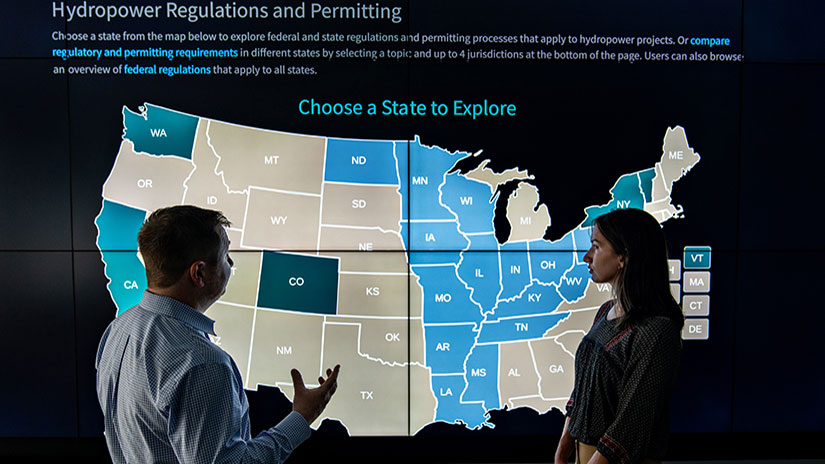Water Research Data and Tools
NREL researchers develop and host a range of water tools, data, and information to enable state-of-the-art design and analysis in marine energy, integrated water systems, and hydropower research.
Check out additional marine energy data access and analysis tools.

Hydropower
The interactive map and geospatial data show closed-loop pumped storage hydropower supply curves, which characterize the quantity, quality, and cost of closed-loop pumped storage hydropower resources.
The hydropower emulation platform uses the Advanced Research on Integrated Energy Systems platform to provide control prototyping, evaluating, and validating of existing and novel hydropower technologies in a real-time environment using a hardware-in-the-loop approach.
The Pumped Storage Hydropower Cost Estimation Tool can calculate cost and performance for specific development sites.
The RAPID Toolkit provides information about federal, state, and local permitting and regulations for renewable energy and transmission projects.
The ReEDS model has an industry-unique capability to include water resources as a constraint to future electricity development, and also has high geographic resolution.
The REPRA model can be used to evaluate power plant vulnerabilities from various factors, including water.
Marine Energy
The Marine Energy Atlas is an interactive mapping tool developed to explore potential for marine and hydrokinetic resources. The atlas depicts and maps U.S. wave energy, tidal, ocean, ocean thermal, and riverine current resources in the United States. Users can explore several variables in each of these mapped resource types using data layers. Dive into the Marine Energy Atlas on NREL's YouTube channel.
Marine Energy Software is a knowledge hub on PRIMRE with a searchable online software discovery platform that allows users to perform faceted searches to identify software tools, codes, and other software products that they can use for MRE-related tasks.
The MHK Instrumentation and Sensor Database is a searchable collection of information for instrumentation and sensors relevant for assessing MHK systems in the field and laboratory.
MHKiT is open-source software, developed in Python and MATLAB, for rapid data processing, visualization, quality control, resource assessment, and device performance.
OpenFAST is a publicly available software that gives users the ability to model marine energy turbines and simulates the forces water exerts on a submerged tidal turbine during operation. The tool is helping advance the Powering the Blue Economy™ initiative by providing essential data for marine energy developers to understand how their devices might perform in open water.
The Small WEC Analysis tool, an online, publicly available graphical user interface, provides users with baseline information about the performance of different types of wave energy converters (WECs) in various ocean settings. Watch an informational webinar about the tool.
The Technology Performance Level Assessment tool evaluates the techno-economic performance potential of early-stage wave energy converter concepts.
Originally developed for the wind industry, TurbSim provides a numerical simulation of the fluid inflow to an energy device, including turbulence. Its purpose is to provide device designers with the ability to drive their design code simulations with simulated inflow turbulence environments that incorporate many of the important fluid dynamic features known to adversely affect the device response and loading on the equipment.
WEC-Sim is an open-source simulation tool for wave energy converters. WEC-Sim has the ability to model systems comprising rigid bodies, power take-off systems, and mooring systems. The simulations involve solving the governing equations of motion in six degrees of freedom. WEC-Sim can now be used in conjunction with the MOST tool to also simulate floating offshore wind turbines.
The WEC Design Response Toolbox provides extreme response and fatigue analysis tools specifically for design analysis of ocean structures such as wave energy converters.
The WPTO Wave Hindcast Dataset provides wave data spanning 1979–2020, which feeds into the Marine Energy Atlas and the Marine and Hydrokinetic Toolkit and can be accessed directly online or downloaded via Amazon Web Services.
Integrated Water Systems
The climate and water risk modeling and analysis framework and Water Risk Visualization and Analysis Tool evaluate how future climate and water conditions might impact power grid electricity generation assets and systems.
The REopt techno-economic decision-support platform recommends the optimal mix of renewable energy, conventional generation, and energy storage technologies to meet cost savings, resilience, and energy performance goals.
Water DAMS, funded by the National Alliance for Water Innovation, provides access to foundational water treatment technology data that enable researchers and decision makers to identify and quantify opportunities for technology innovations to reduce the cost and energy intensity of desalination.
WaterTAP, funded by the National Alliance for Water Innovation, is an open-source, Python-based software package that supports the technoeconomic assessment of full water treatment trains, and uses open-source models and data indexed in the Water DAMS platform. WaterTAP is available on GitHub with documentation.
Cross-Technology
The Jobs and Economic Development Impact (JEDI) models are user-friendly screening tools that estimate the economic impacts of constructing and operating power plants, fuel production facilities, and other projects at the local (usually state) level. Based on user-entered project-specific data or default inputs (derived from industry norms), JEDI estimates the number of jobs and economic impacts to a local area that can reasonably be supported by a power plant, fuel production facility, or other project.
Share
